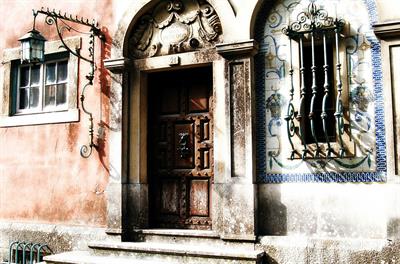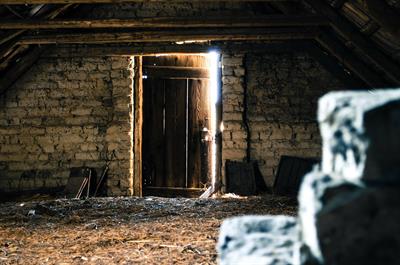PDF chapter test TRY NOW
The lesson "The Attic" is a short story written in the first person that deals directly with human flaws and the power of forgiveness. The lesson was written by Satyajit Ray.
The lesson opens with the narrator introducing Aditya to the readers. The narrator and Aditya were friends and business partners. They had newly started a factory in Deodarganj. One day, as they were driving down National Highway 40, they came to a point where the road diverged into two distinct ways. They both knew that driving ten kilometres along the road that split to the right would take them to Bramhapur.
The lesson opens with the narrator introducing Aditya to the readers. The narrator and Aditya were friends and business partners. They had newly started a factory in Deodarganj. One day, as they were driving down National Highway 40, they came to a point where the road diverged into two distinct ways. They both knew that driving ten kilometres along the road that split to the right would take them to Bramhapur.

Factory at Deodarganj
While thinking about the path, the narrator asks his friend Aditya whether he wishes to visit his birthplace. Aditya had left his hometown after finishing his matriculation exams at a nearby local school. When the narrator asked about revisiting the place, Aditya recalled the lovely experiences in his hometown. He said that he had left his ancestral home twenty-nine years ago. The house Aditya left was about 200 years old, and it was constructed during the period of his forefathers. After thinking about the house, he recollected his childhood school. Aditya was not sure even the school building, which had undergone a lot of alterations, would be recognisable. He also remarked that recalling his childhood memories would lead to disappointment.

Aditya's ancestral house
Aditya then expressed his desire to visit Nagen uncle's tea shop if it was still there. He wished to have a cup of tea from the tea shop. So they chose the right turn and decided to travel to Bramhapur.

The narrator and Aditya took right turn
Aditya's ancestors were once the Zamindars, and they lived in Bramhapur. Aditya's father had left the ancestral home and relocated to Kolkata to start a new business. His father passed away after a few years. As a result, Aditya inherited his father's business. Since the narrator was his friend, Aditya involved him in his firm and made him a partner. Aditya and the narrator then arrive at Bramhapur. They came during the month of Magha, which was the middle of the winter. The Magha is a month of the Hindu calendar. It is the year's eleventh month in India's national civil calendar, corresponding to January or February in the Gregorian calendar. Later, Aditya and the narrator reached the location at about 3:30 p.m.
The narrator then went on to explain the surrounding landscape. He described the sun as relaxing. Both sides of the road were covered with paddy fields, and nothing could be seen. After seeing the field, he felt that the harvest had ended and the crop had been good that year. After a ten-minute drive, Aditya and the narrator arrive at Aditya's local school. Iron gates safeguarded the school's main entrance. There was a playground and a two-storeyed school building beyond the iron gates. The narrator and Aditya then got down from the car and stood before the gate.

Paddy fields
While standing in front of the iron gate, the narrator asks Aditya if everything is still the same. The phrase "everything was still the same" in this context refers to the narrator asking him if the school was the same as when he left it twenty-nine years ago. When Aditya heard that, he said, "everything had changed."

Iron gate
Aditya then narrated to the narrator how things had changed compared to the olden days. When he was a student, the school was a one-storeyed building. As time passed, another building was constructed. He also indicated that it had never been there before.
The narrator then asked Aditya whether he was not good at school. After hearing that, Aditya responded, "yes". However, he said that he would always be in second place. After that, they headed to the tea shop. The owner of the tea shop was Nagen uncle. The tea shop was located next to a grocery store across from a Lord Shiva temple. They soon noticed 'Nagen's Tea Cabin' inscribed on the shop's signboard.
When the narrator and Aditya reached the tea shop, they see Nagen uncle. He was already finished sixty (age) and seemed slightly rugged in appearance. His hair appeared white, and he had nicely combed it. He wore a dhoti with a blue striped shirt and a green scarf over his shirt.
Nagen uncle didn't recognise Aditya after seeing him. Nagen uncle asked them where they had come from. The reason behind his question was that he had never seen them before. When an unknown person visits a new location, the residents ask similar questions to the stranger. When Aditya heard Nagen uncle's question, he replied that they were from 'Deodarganj' and were on their way to Kolkata.
After hearing Aditya's response, Nagen uncle felt surprised, and he asked them why they were there and what they were doing in Bramhapur. Later, Aditya said that they came to have tea in his shop. Nagen uncle then said that his shop had biscuits, savouries, and tea. Aditya then ordered two "nankhatai," one for himself and the other for the narrator. They were seated on two tin seats. They observed a person seated at a corner table was neither eating nor drinking tea. He seemed to be sleeping by sitting with his head bent.
After hearing Aditya's response, Nagen uncle felt surprised, and he asked them why they were there and what they were doing in Bramhapur. Later, Aditya said that they came to have tea in his shop. Nagen uncle then said that his shop had biscuits, savouries, and tea. Aditya then ordered two "nankhatai," one for himself and the other for the narrator. They were seated on two tin seats. They observed a person seated at a corner table was neither eating nor drinking tea. He seemed to be sleeping by sitting with his head bent.

Tea and biscuits
Nagen uncle addressed the man as Mr Sanyal. He reminded the man to go home. He stated that it was already 4 pm and that his tea shop's other customers would arrive. Then Nagen uncle, with a wink in his eye, told Aditya and the narrator that Mr Sanyal couldn't hear properly. He also stated that he could not see and lacked the financial means to purchase spectacles. Mr Sanyal then jumped up, stretched himself, raised his lean right arm and recited a Tagore poem, Panraksha ('Keeping of a Promise'), with his eyes enlarged. After seeing Mr Sanyal, the narrator questions if he was a little insane. Mr Sanyal then walked away from the tea shop, making a Namaste gesture with his hands to no one in particular.
The narrator then noticed a sudden change in Aditya's expression. So he asked him what the reason behind it was. But Aditya did not answer the narrator's question. Instead, he asked Nagen uncle who the man was and what he did.
After hearing that, Nagen uncle responded that the man's name was Sasanka Sanyal. Furthermore, he stated that he lived a pathetic life and went crazy. Nagen uncle believed that Sanyal hadn't forgotten anything from the past.
After hearing that, Nagen uncle responded that the man's name was Sasanka Sanyal. Furthermore, he stated that he lived a pathetic life and went crazy. Nagen uncle believed that Sanyal hadn't forgotten anything from the past.
Later, Nagen uncle said that Sanyal had sold his land to someone as a requirement for his daughter's marriage. He went on to say that the gentleman had lost his wife and son in the previous year. As a result, the man had changed and no longer appeared normal. Aditya later inquired about the man's residence.
Nagen uncle then said that Mr Sanyal stays with his father's friend, Jogesh Kabiraj. Then he mentioned that Sanyal would come to his tea shop regularly to have biscuits and tea. Also, he mentioned that Sanyal would always pay the amount once he finished his tea and biscuit. He also said that Sanyal was a man with self-respect. After telling the good qualities of Sanyal, Nagen uncle said that he was not sure how long things would happen in the same way.
Aditya and the narrator get into the car after paying their bill. They thought of finding the location of Jogesh Kabiraj's home. Aditya was in the driver's seat, and he started driving the car. Aditya then expressed his desire of revisiting his home. He said that it was necessary to go home. After telling that, Aditya appeared to be nervous for some reason. The narrator and Aditya then arrive at Aditya's residence. Tall walls encircled the house. Even from the ruins, it was easy to imagine how grand the home must have been once upon a time.
The narrator and Aditya then enter the old building. They climbed the stairs to the attic on the house's second floor. After arriving at the location, Aditya stated, "This was my favourite room". He went on to say that the children's favourite room has always been the attic. In the attic, the infant looked to be in its universe. In addition, he said that there had been a broken wall in the attic. Through that, they could see the sky, the paddy field, a bit of the rice mill, and the spire of the old temple.

Attic
The attic had undoubtedly taken the brunt of the wind and weather damage compared to the rest of the house. The floor was covered with twigs and straw and pigeon droppings. The things found in the attic were a shattered cricket bat, armchair parts, and a wooden packing container.
Aditya climbed to the top of the packing box and placed his hand into the hole, causing a sparrow's nest to fall to the ground. When he finally encountered what he was looking for, he breathed a sigh of relief. After seeing that, the narrator asked him what it was. Aditya then responded that he would get to know about that very soon.
Aditya and the narrator visit a jewellery store. They went to measure the weight of the item they were carrying. The jeweller recognised the piece as an antique after seeing it. They then proceeded to the Jogesh Kabiraj residence, the next stop on the route. Though the narrator was curious about what was going on, he didn't ask him any questions. So he paid attention and watched Aditya's movements.
Aditya and the narrator entered Jogesh Kabiraj's house and proceeded to Sasanka Sanyal's room. Sasanka uncle was engaged in reciting Tagore lyrics. They waited for him to finish reciting Tagore's verses. After finishing the verses, Aditya asked, 'May we come in?' After hearing Aditya's voice, Sasanka turned and looked at them.
Sasanka uncle said unsurprisingly that no one would come and visit him. Then Aditya asked him if it was okay if they came inside his room. He then asked them to come in. They entered the room. There was nothing to sit on except a charpoy. So they remained standing on the floor.
Aditya then asked Sasanka whether he remembered Aditya Narayan Chowdhury. After hearing that, he said, 'Of course'. Sasanka then said that Aditya was the spoilt child of well-to-do parents. He was a decent student, but he could never defeat him. He was envious of his success, and he had a habit of lying.
After hearing that, Aditya said, ", "I know", and took out a packet from his pocket and handed it over to him. He then stated that it belonged to him, and Aditya instructed him to hand it over to Sasanka. Aditya made the statement because he believed Sasanka uncle was unaware of his existence. As a result, he pretended to be Aditya's friend and handed him the packet.
Aditya and the narrator entered Jogesh Kabiraj's house and proceeded to Sasanka Sanyal's room. Sasanka uncle was engaged in reciting Tagore lyrics. They waited for him to finish reciting Tagore's verses. After finishing the verses, Aditya asked, 'May we come in?' After hearing Aditya's voice, Sasanka turned and looked at them.
Sasanka uncle said unsurprisingly that no one would come and visit him. Then Aditya asked him if it was okay if they came inside his room. He then asked them to come in. They entered the room. There was nothing to sit on except a charpoy. So they remained standing on the floor.
Aditya then asked Sasanka whether he remembered Aditya Narayan Chowdhury. After hearing that, he said, 'Of course'. Sasanka then said that Aditya was the spoilt child of well-to-do parents. He was a decent student, but he could never defeat him. He was envious of his success, and he had a habit of lying.
After hearing that, Aditya said, ", "I know", and took out a packet from his pocket and handed it over to him. He then stated that it belonged to him, and Aditya instructed him to hand it over to Sasanka. Aditya made the statement because he believed Sasanka uncle was unaware of his existence. As a result, he pretended to be Aditya's friend and handed him the packet.
After seeing the packet, Sasanka uncle asked Aditya, 'What is it? Aditya then responded that it was money. Sasanka then asked him how much money was there inside that packet. Later, Aditya responded, 'One hundred and fifty rupees'. He said that Aditya would be happy if he accepted the money. After hearing that, Sasanka uncle asked him whether he had to cry or laugh at that moment after thinking about his gift. Then he enquired him why Aditya had sudden generosity over him.
Aditya then responded that people would change gradually. He also stated that Aditya was not the same as before. After hearing this, Sasanka inquired how he had changed after all these years and began to tell an old story that had occurred years before. Sasanka informed Aditya that he had won a prize, but Aditya couldn't bear it. As a result, he requested him to give the medal to him so that he could show it to his father. Aditya, on the other hand, never returned the award. He also said that his pocket had a hole in it and something had fallen through it.
Later, Aditya explained that the amount represented the medal's cost and that the real worth should have belonged to Sasanka. Sasanka was taken aback when he heard it, and he looked at Aditya and remarked that it was a silver medal and that the cost of the silver medal would not exceed five rupees.
Aditya then responded that people would change gradually. He also stated that Aditya was not the same as before. After hearing this, Sasanka inquired how he had changed after all these years and began to tell an old story that had occurred years before. Sasanka informed Aditya that he had won a prize, but Aditya couldn't bear it. As a result, he requested him to give the medal to him so that he could show it to his father. Aditya, on the other hand, never returned the award. He also said that his pocket had a hole in it and something had fallen through it.
Later, Aditya explained that the amount represented the medal's cost and that the real worth should have belonged to Sasanka. Sasanka was taken aback when he heard it, and he looked at Aditya and remarked that it was a silver medal and that the cost of the silver medal would not exceed five rupees.

Silver medal
Aditya then remarked that silver was now thirty times more expensive than it had been previously. Sasanka said he was unaware of the news. Sasanka uncle turned to face Aditya after looking at the fifteen ten-rupee notes in his palm. His face had taken on a completely different look. He told Aditya that the money he had given him appeared to be offered in the sense of compassion.
After hearing that, Aditya and the narrator didn't say anything. Sasanka uncle stated he had seen Aditya in Nagen uncle's tea shop and recognised him by the mole on his right cheek. Furthermore, Sasanka stated that he was aware that Aditya had not recognised him, so he delivered the same poetry he had recited on the day of the prize-giving ceremony. He did that to remind Aditya of the previous incident and himself. Then he said he couldn't control his rage when Aditya came to meet him.
Aditya afterwards stated that Sasanka had made the correct decision. His grievances were quite understandable. He then stated that he would be pleased if Sasanka took the money, but Sasanka then stated the money would be spent as soon as possible instead. He would have wanted to accept the medal if possible. He further stated that if he could reclaim the medal, he would have forgotten about the horrible incident from his childhood. The medal was preserved in the attic for two decades and eventually returned to its rightful owner. The phrases 'Sriman Sasanka Sanyal – Special Prize for Recitation – 1948' was still engraved on the medal.
Aditya afterwards stated that Sasanka had made the correct decision. His grievances were quite understandable. He then stated that he would be pleased if Sasanka took the money, but Sasanka then stated the money would be spent as soon as possible instead. He would have wanted to accept the medal if possible. He further stated that if he could reclaim the medal, he would have forgotten about the horrible incident from his childhood. The medal was preserved in the attic for two decades and eventually returned to its rightful owner. The phrases 'Sriman Sasanka Sanyal – Special Prize for Recitation – 1948' was still engraved on the medal.
